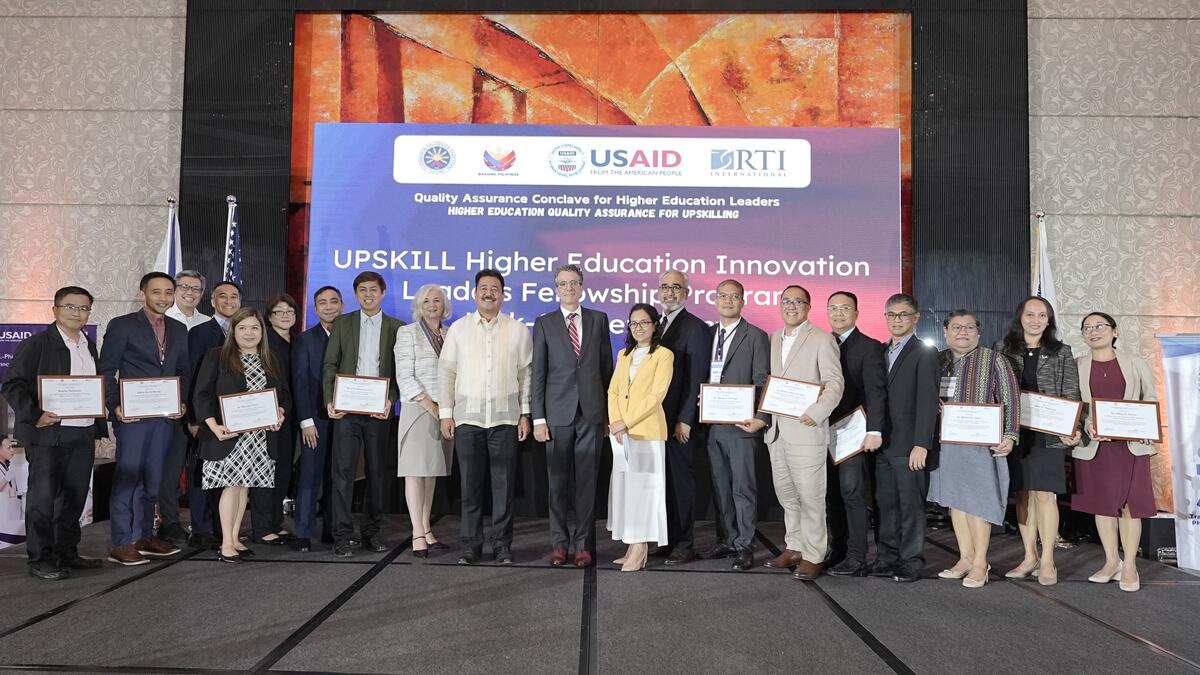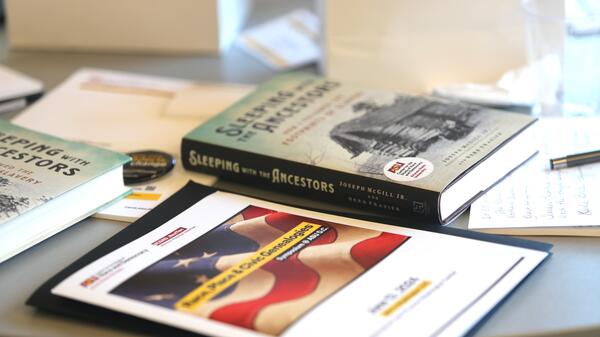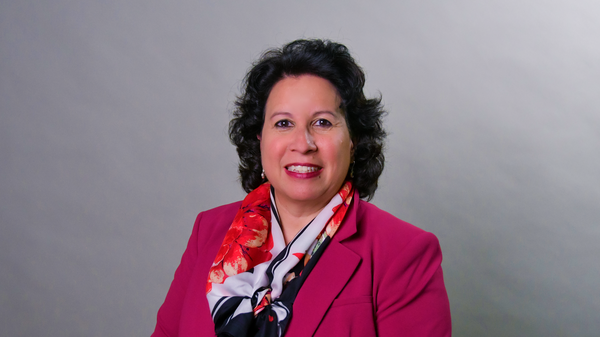New ASU-led fellowship focused on reimagining higher education in the Philippines
ASU 1 of 3 US universities selected to participate in the UPSKILL program

USAID/Philippines Mission Director Ryan Washburn (center, in suit and tie) and CHED Chairman J. Prospero De Vera III (center in white button-down shirt) launch the USAID UPSKILL Higher Education Innovation Leaders Fellowship Program. The launch featured the first batch of fellows, composed of 16 senior academic leaders and higher education officials from across the Philippines who will participate in an eight-month learning program, including sessions at Arizona State University, so they can drive innovation in their organizations. Photo courtesy U.S. Embassy in Manila
There are more than 2,000 higher education institutions in the Philippines, and a rapidly growing number of university-aged students. However, problems related to access and degree attainment put the country at a critical juncture needing to adapt its higher education strategy for a rapidly changing global economic landscape.
To help address that need, the University Design Institute at Arizona State University launched a new fellowship program last month as part of a multiyear, multimillion-dollar effort to transform higher education on a nationwide scale in the Philippines.
The Higher Education Innovation Leaders Fellowship Program is one of the initial phases of the $30 million United States-Philippines Partnership for Skills, Innovation, and Life-long Learning, or UPSKILLThe UPSKILL program is a five-year, roughly $30 million initiative that will bring together multiple U.S. universities, Philippines government agencies and private sector partners to promote innovation and entrepreneurship in higher education institutions through faculty and staff training, curriculum improvements and increasing community outreach and technology transfer, according to an announcement from USAID, or U.S. Agency for International Development, which is funding the program. , initiative.
The fellowship program will bring together 16 senior academic officials from across 12 institutions and the Commission on Higher Education in the Philippines — the federal government agency for higher education in the Philippines — to gain new skills enabling them to become leaders as designers within their institutions and serve as ambassadors for change within their respective institutions. ASU’s University Design Institute will lead the fellows through a series of facilitated sessions, both virtually and in person in the Philippines and Arizona.
“These fellows will be bringing contributions and cultivating advocacies of transformation through the fellowship program. I look forward to seeing (them) working collectively toward a goal of a strengthened higher education system leading to inclusive growth in the Philippines,” Commission on Higher Education Chairman J. Prospero De Vera III said in a statement.
Throughout the eight-month fellowship, which culminates in a weeklong visit to ASU in the fall, the 16 fellows will study global trends in higher education, gain tools and techniques for higher education design, and learn how to transform higher education on a local scale. Sessions will be led by University Design Institute leaders, and experts and will include other global and local experts.
ASU, through the University Design Institute’s involvement, was one of threeIncluding the Massachusetts Institute of Technology and North Carolina Agricultural & Technical State University. U.S. university partners selected to participate in the program as part of a consortium led by RTI International.
“Arizona State University is a pioneer in making higher education accessible on a global level,” said ASU President Michael M. Crow. “We are fully engaged in finding innovative ways to create teaching and learning impact at scale, and we are excited to have a leading role in transforming the future of higher education in the Philippines.”
Each university participating in the UPSKILL program will focus on specific segments of the overall effort. For ASU’s University Design Institute, which specializes in working with higher education systems, institutions and their leaders, the focus will be four key activities that will strengthen higher education capacity in the Philippines: the Innovation Leaders Fellowship; a transformation accelerator program to develop capacity for community impact in 40 universities; a design collaboratory that will act as an evergreen knowledge hub for more than 2,000 higher education institutions; and the development of a new entity that will sustain these projects beyond the five years of this program.
“We are thrilled to be part of the UPSKILL project and involved in shaping the future of higher education in the Philippines,” said Minu Ipe, vice chair and managing director of the University Design Institute. “The activities we are leading will strengthen the capacity for innovation and change, within universities and across the system in this vibrant nation.”
Led by RTI International, UPSKILL will build upon the 10-year Science, Technology, Research and Innovation for Development, or STRIDE, program, which focuses on collaborative research between industry and academia, according to RTI. The UPSKILL program will build upon that success to expand innovation and workforce development policies throughout the country.
More University news

ASU symposium connects race, place and civic genealogies
For Phoenix-based civil rights leader Carole Coles Henry, uncovering the lineage of her ancestors has been a goal more than 50 years in the making. Her research, made difficult by the lack of…

Charla Griffy-Brown named director general and dean of Thunderbird at ASU
As Thunderbird School of Global Management enters its 10th year as part of Arizona State University, a new decade welcomes the next director general and dean, Charla Griffy-Brown. Her post begins…

ASU Research Park celebrates 40 years of collaboration, innovation
The Arizona State University Research Park celebrates its 40th anniversary this year as the university’s original Innovation Zone, where the university and the private sector collaborate around their…